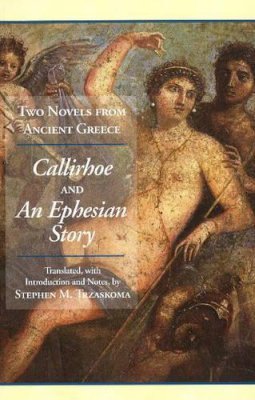20%OFF

Stock image for illustration purposes only - book cover, edition or condition may vary.
Two Novels from Ancient Greece: Chariton´s Callirhoe and Xenophon of Ephesos´ An Ephesian Story: Anthia and Habrocomes
Chariton
€ 21.99
€ 17.49
FREE Delivery in Ireland
Description for Two Novels from Ancient Greece: Chariton´s Callirhoe and Xenophon of Ephesos´ An Ephesian Story: Anthia and Habrocomes
Paperback. Includes translations of the earliest preserved novels in ancient Greek that offer us a glimpse of the beginning of prose fiction in the western world. Translator(s): Trzaskoma, Stephen M. Num Pages: 236 pages, maps. BIC Classification: FC; FYT. Category: (G) General (US: Trade). Dimension: 214 x 142 x 12. Weight in Grams: 286.
Here in one convenient volume are the two earliest examples of the ancient Greek novel.
Product Details
Format
Paperback
Publication date
2010
Publisher
Hackett Publishing Co, Inc United States
Number of pages
195
Condition
New
Number of Pages
236
Place of Publication
Cambridge, MA, United States
ISBN
9781603841924
SKU
V9781603841924
Shipping Time
Usually ships in 5 to 9 working days
Ref
99-2
About Chariton
Stephen M. Trzaskoma is Associate Professor of Classics, The University of New Hampshire.
Reviews for Two Novels from Ancient Greece: Chariton´s Callirhoe and Xenophon of Ephesos´ An Ephesian Story: Anthia and Habrocomes
Since these texts first found their way into the mainstream of Classics instruction twenty years ago, the need for new translations has become obvious, not only because of the textual and theoretical advances made in the interim, but because of demand for examining them in broader contexts. For both surveys of Greek and Roman literature and courses on the history of prose fiction, that demand has now been elegantly met. Trzaskoma's translation, based on greatly improved Greek texts, shows a sophisticated appreciation of the range in vocabulary and tone within Chariton, and similarities and differences in style between Chariton and Xenophon become easily apparent. Chariton may be a naïve romance by some classifications, but the text's intertextual dimensions, described in a helpful introduction that avoids prescribing how to interpret these texts, are now made much clearer. The copious annotations not only provide topical references but also mark the wide range of literary allusions and parallels. From every angle these texts have received a detailed rethinking. The Chariton and Xenophon I thought I knew have become much richer and more compelling texts. Any student of the ancient novel, and any teacher wanting to create more students of the ancient novel, needs to read this book.
Joel C. Relihan, Professor of Classics, Wheaton College (Norton, Mass.) I enjoyed this edition very much
the translations are readable while maintaining a strong sense of the originals. The introduction materials are informative and accessible making this text suitable for undergraduate teaching. I also appreciate the formatting—with cultural information and allusions to other authors in footnote and more technical information on the manuscript in endnote. A helpful bibliography is also included.
Kristen Day, Augustana College Accurate and fresh translations of the two earliest Greek novels. . . . A keen textual critic himself, Trzaskoma has published a number of contributions on the novels, offering improvements to the text and identifying additional allusions to classical authors. He includes endnotes to both translations detailing his own conjectures and differences with Reardon and Sullivan, all of which bespeaks a complete reexamination of the texts in preparation for his translations. Although . . . designed for undergraduate courses where these novels will be read by Greekless students, every effort has been made to provide as much information about difficulties in the texts as possible, so these translations will be useful to those interested in the Greek text as well. An unpretentious introduction that will be very appropriate and useful to students reading ancient novels for the first time covers judiciously the major issues relevant to getting started with these stories. . . . It is valuable to read [these two novels] together, and this new text will make that easy and inexpensive to do.
Stephen A. Nimis, Miami University, in The Bryn Mawr Classical Review
Joel C. Relihan, Professor of Classics, Wheaton College (Norton, Mass.) I enjoyed this edition very much
the translations are readable while maintaining a strong sense of the originals. The introduction materials are informative and accessible making this text suitable for undergraduate teaching. I also appreciate the formatting—with cultural information and allusions to other authors in footnote and more technical information on the manuscript in endnote. A helpful bibliography is also included.
Kristen Day, Augustana College Accurate and fresh translations of the two earliest Greek novels. . . . A keen textual critic himself, Trzaskoma has published a number of contributions on the novels, offering improvements to the text and identifying additional allusions to classical authors. He includes endnotes to both translations detailing his own conjectures and differences with Reardon and Sullivan, all of which bespeaks a complete reexamination of the texts in preparation for his translations. Although . . . designed for undergraduate courses where these novels will be read by Greekless students, every effort has been made to provide as much information about difficulties in the texts as possible, so these translations will be useful to those interested in the Greek text as well. An unpretentious introduction that will be very appropriate and useful to students reading ancient novels for the first time covers judiciously the major issues relevant to getting started with these stories. . . . It is valuable to read [these two novels] together, and this new text will make that easy and inexpensive to do.
Stephen A. Nimis, Miami University, in The Bryn Mawr Classical Review
